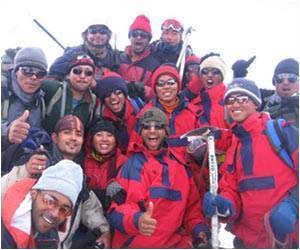 The genetic basis of chronic mountain sickness (CMS) or Monge's disease were decoded by researchers.
The genetic basis of chronic mountain sickness (CMS) or Monge's disease were decoded by researchers. Their study provides important information that validates the genetic basis of adaptation to high altitudes, and provides potential targets for CMS treatment.More than 140 million people have permanently settled on high-altitude regions, on continents ranging from African and Asia to South America. The low-oxygen conditions at such high altitudes present a challenge for survival, and these geographically distinct populations have adapted to cope with hypoxia, or low levels of oxygen in the blood.
Interestingly, many humans living at high elevations, particularly in the Andes mountain region of South America, are maladapted and suffer CMS. The disease is characterized by an array of neurologic symptoms, including headache, fatigue, sleepiness and depression.
Often, people with CMS suffer from strokes or heart attacks in early adulthood because of increased blood viscosity (resistance to blood flow that can result in decreased oxygen delivery to organs and tissues).
Past studies of various populations show that CMS is common in Andeans, occasionally found in Tibetans and absent from Ethiopians living on the East African high-altitude plateau.
Therefore, the researchers dissected the genetic mechanisms underlying high-altitude adaptation by comparing genetic variation between Peruvian individuals from the Andes region with CMS and adapted subjects without CMS, using whole genome sequencing.
They identified two genes, ANP32D and SENP1, with significantly increased expression in the CMS individuals when compared to the non-CMS individuals, and hypothesized that down-regulating these genes could be beneficial in coping with hypoxia.
Principal investigator Gabriel G. Haddad, Distinguished Professor and chair of the Department of Pediatrics at UC San Diego School of Medicine, and Physician-in-Chief and Chief Scientific Officer at Rady Children's Hospital-San Diego, a research affiliate of UC San Diego, said that while a number of published articles have described an association between certain genes and the ability for humans to withstand low oxygen at high levels, it was very hard to be sure if the association was causal.
The researchers therefore looked at genetic orthologs - corresponding gene sequences from another species, in this case the fruit fly - to assess the impact of observed genetic changes on function under conditions of hypoxia.
The study is set to be published online in the American Journal of Human Genetics.
Source-ANI


No comments:
Post a Comment